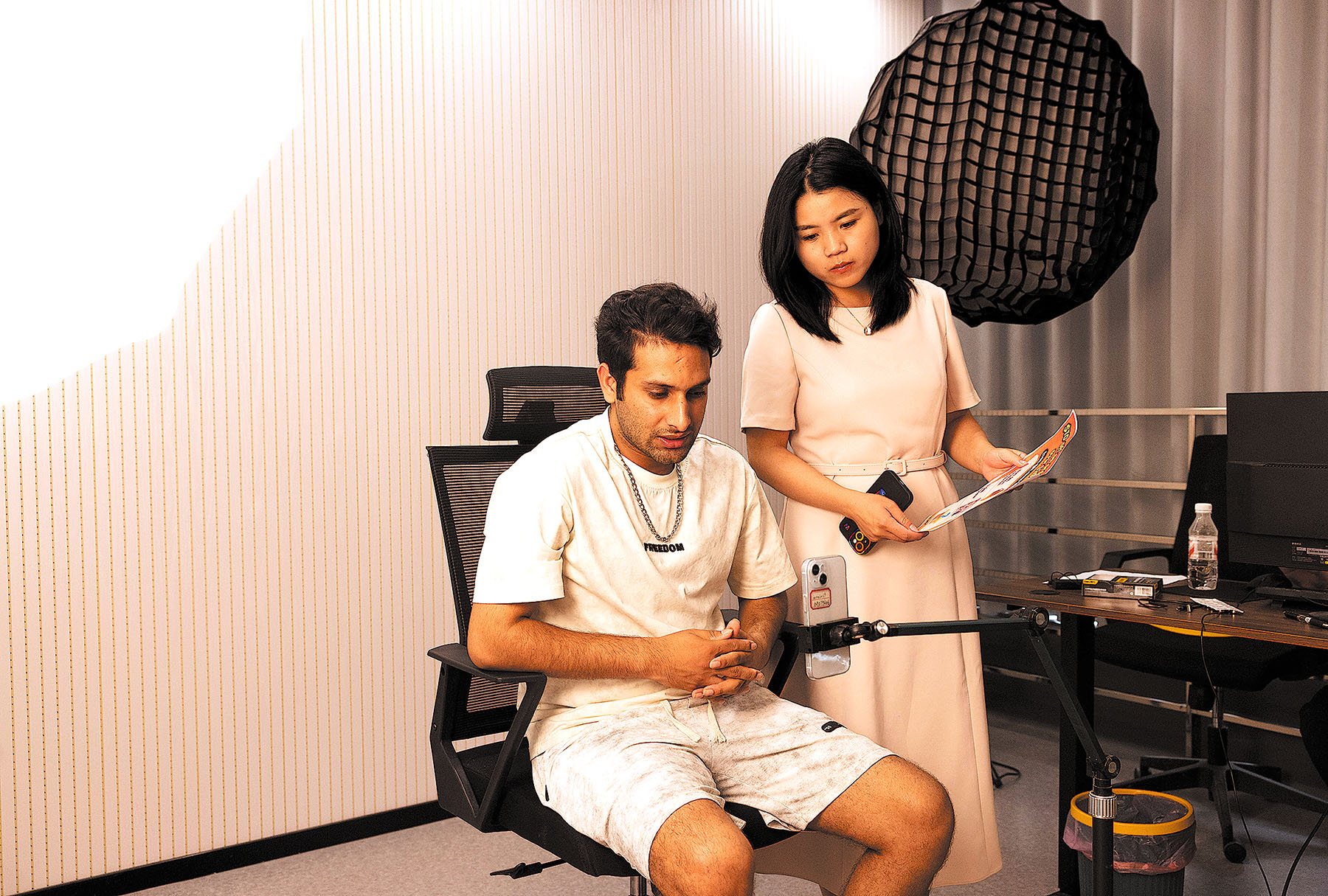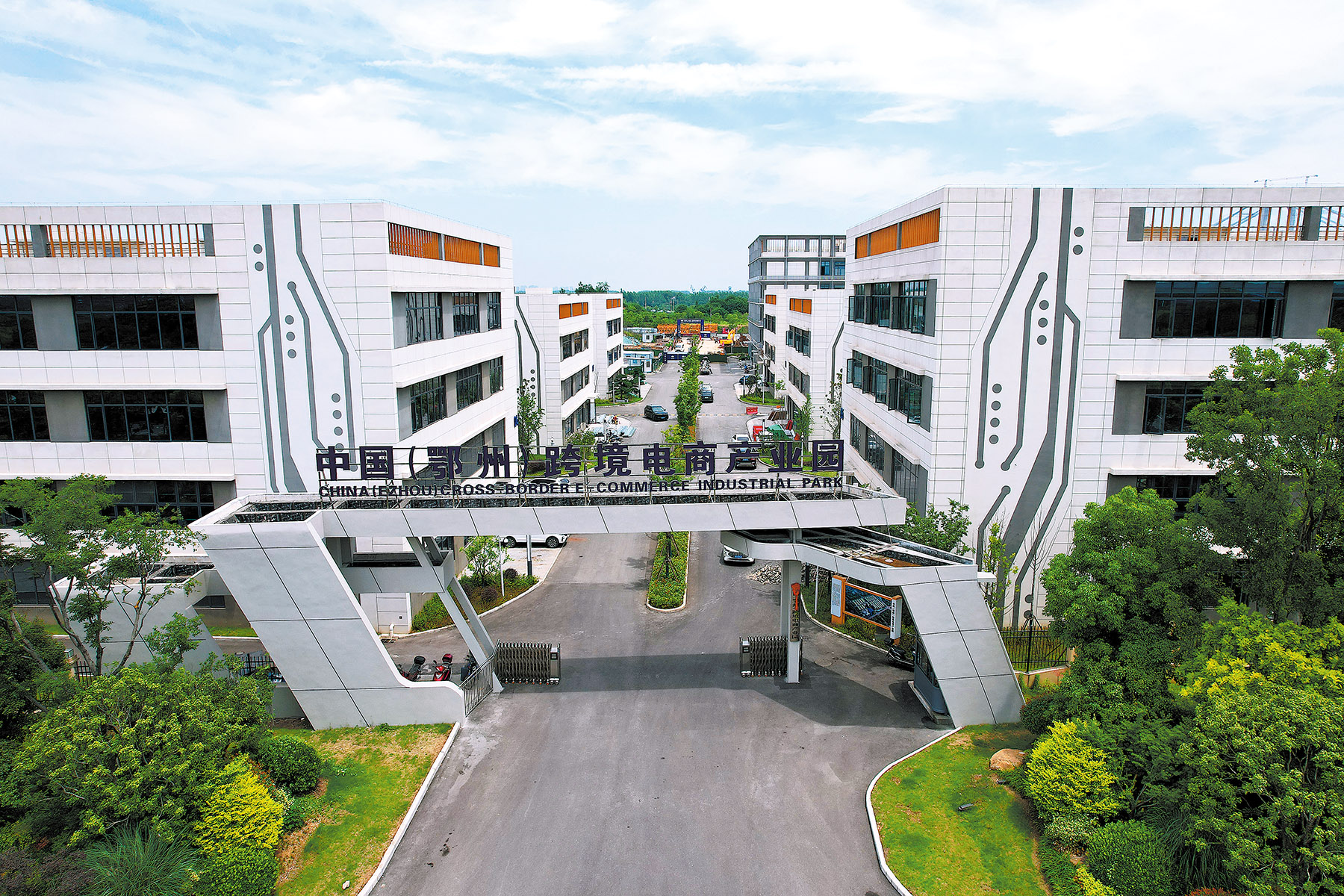Thanks to airport, Ezhou in Hubei province going gangbusters on cross-border e-commerce

Ezhou is not a coastal trading port. It has no bustling harbor or long tradition of container terminals being sent around the world. Yet in the middle of Central China's Hubei province, a different kind of gateway is rising. At its heart is the Ezhou Huahu International Airport, Asia's first cargo-dedicated hub, which has quickly become the anchor for the inland city's full embrace of cross-border e-commerce.
The roar of a wide-body freighter's engines reverberates across the airport. Beyond the runway, another kind of takeoff is underway. Inside sleek new office towers, livestreaming anchors check their consoles for broadcasts, young product scouts track social media feeds for the next viral items and small-scale entrepreneurs draft export strategies on laptops.
This is China (Ezhou) Cross-border E-commerce Industrial Park. Launched only this spring, the park has already attracted 258 companies, with 62 setting up offices on site, with trade volume topping $310 million in its first three months of operations.
READ MORE: Hubei's new airfreight hub marks a first for Asia
At the center of this story is Bi Wei, a 29-year-old entrepreneur and one of China's rising "post-95" business leaders — the generation born after 1995. She heads the park's operations, leading a team with an average age of just 25. Yet they are orchestrating a platform that integrates data analytics, supply chains and international logistics.
Bi's own path into this field traces back to her college years. Like many of her peers, she first encountered e-commerce through imported cosmetics. "We would huddle around our phones, checking discounts on apps," she recalled. Later, during trips abroad, she browsed shops not to buy, but to study what foreign consumers were chasing.
By 2018, when she graduated, Chinese shoppers were already accustomed to buying overseas products online. What caught Bi's attention, though, was the reverse flow as small factories in China quietly began listing products on Amazon, then shipping them abroad.
"A company could put an item online today, and it would sell tomorrow. I thought this is the future," she said.
She watched as a wave of young entrepreneurs, some barely older than her, built export businesses worth millions. By 2022, Bi returned to Hubei to take on a bigger role. The following year she became executive secretary-general of the province's e-commerce association, and then accepted the challenge of running the new cross-border e-commerce park.
"Cross-border is about spotting where the demand will be, not where it is or was," Bi said. "We rely on data from social chatter, platform trend charts, and even the wording buyers use in reviews. Once we see a sales spike coming, we act. If we wait, someone else will seize it."
The instinctive grasp of online culture and platform dynamics, Bi and her peers believe, is what separates the post-95 generation from traditional exporters. Instead of waiting for trade fairs or overseas distributor networks, they track memes and hashtags.

However, none of this would matter without the Huahu airport, designed specifically for cargo and run by logistics giant SF Express, just a 10-minute drive from the park.
"This is our secret weapon," Bi said. "We can promise next-day delivery to global markets. On top of that, warehouse rents are lower than in coastal hubs, labor costs are cheaper. For small and medium enterprises, this lowers the threshold to 'go global'."
As of Sunday, the airport had launched 106 cargo routes, including 45 international routes, with its cargo and mail throughput exceeding 1.06 million metric tons since Jan 1. According to Hu Jing, general manager of Ezhou Aviation Cargo Co Ltd, the airport's dedicated e-commerce clearance channels shave hours off Customs time and three express security lanes dedicated to e-commerce cargo improve the efficiency of cargo checks.
But the park is not merely a logistics extension. Bi's team believes closing the information gap is key. Many SMEs don't know what sells abroad, or how to tailor their products for different markets. The park uses analytics to identify demand, then works backward. They encourage export firms to create country-specific versions of products like strollers customized for local safety standards or electronics for local design tastes.
"It's not about pushing goods we happen to have," Bi explained. "It's about asking what they actually want and then working backward to source or customize."
For industry expert Huang Lingyu, who leads the park's livestream operations team, the next leap lies in artificial intelligence.
"Cross-border breakthroughs could come in logistics tracking and customer service. AI will help predict shipping risks before they happen, and multilingual smart customer service will allow SMEs to talk to global buyers almost instantly," Huang said.
The Ministry of Commerce said China's imports and exports of digitally deliverable services reached 1.5 trillion yuan ($210 billion) in the first half, while cross-border e-commerce trade hit 1.3 trillion yuan, both record highs.
Still, talent is a bottleneck. Few workers can juggle digital operations, foreign languages and cultural adaptation all at once. To address this, the park has hosted training sessions with e-commerce platforms such as Alibaba and Tik-Tok, and is planning partnerships with local universities. So far, more than 1,400 trainees have participated in, with many from outside the province. Some graduates have already opened stores while others joined existing exporters.
"Every session, I teach myself," Bi said. "We learn from the companies as much as they learn from us."
Local authorities have amplified the efforts with a package of subsidies, including platform storefronts, overseas warehouses, living stipends for employees and even meal allowances. Zhu Degao, head of the Ezhou Airport Economic Zone's cross-border task force, said: "We use a three-dimensional evaluation system, looking at product competitiveness, market fit and supply chain resilience. The goal is to focus resources on the companies with real global potential, and grow the park into a 100-billion-yuan industry cluster."
Bi's longer-term ambition reaches beyond exports. She wants Ezhou to build brands. The park is encouraging artisans to blend Chinese cultural elements like intangible heritage motifs into products for foreign buyers.
"We don't want to just be a shipping hub," Bi said. "We want to nurture global names that were born in Ezhou. We want global consumers to say: 'This is from Ezhou', not just 'This is from China'."
Bi believes the experiment is still in its early days. "Trade is pulling industry, not the other way around," she said. "The real question isn't what we make. It's what the world does want and how fast we can get it there?"
In Ezhou, with its airport as a logistical anchor, that question is being answered in real time.
Contact the writers at lijing2009@chinadaily.com.cn


